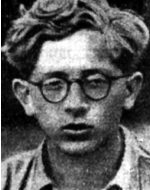Ledanheim, Jacob
He was born on the first day of Adar 1921 in Vienna, the capital of Austria, and his parents emigrated from Vienna to Galicia and stayed at home for a traditional Jewish and Zionist atmosphere. At the age of 12, he began to read books and periodicals on questions of Zionism and socialism, and when he was 14 years old, he was separated from his father and since then he has become a member of himself. From the care and concern of his mother The youth movement Netzah, and despite his mother’s insistence, he stopped his studies in the seventh grade of the school and decided to study art in order to prepare for aliya, but at that time, in 1937, young Jews in Austria were no longer professionally employed. Austria, joined the Zionist pioneering training commune of Hechalutz in Vienna and during the attack on the kibbutz on 9.11.1938, he suffered a severe head injury Shortly before the outbreak of the Second World War he managed to leave for England and was accepted by a group of pioneers from London . From an in-depth study of the theory and practice of socialism, and to some extent under the impression of the failure of the labor movement in Austria, he joined Hashomer Hatzair and was one of its founders and disseminators of Torah among the Jewish youth in East London. After exhausting working days, he went on to study the Marxist theory, political agriculture, and history, and despite his youth he could demand a dialectic of analysis and persuasion and represented the movement at the Zionist Congress. In July 1945, he immigrated to Israel with a group of 20 of his training comrades, spent six months in the English nucleus in Mishmar HaEmek and joined him as a complement to Kibbutz HaMa’apil. Where he worked in a metalwork shop and struggled to overcome his physical weakness and reach the output of a veteran and strong worker. From a firm decision to take root in the life-story of the kibbutz, he was immune to the “doubts” that undermined the mental status of many others and blocked him from a different path. Until his acclimatization in the country, language and lifestyle, he decided to remain silent and abstain from public activity and shut himself up. Newcomers approached them to strengthen their spirits and to be of help in their first steps in the country. During the War of Independence, he served as a conscript in the kibbutz, and when he faced the attack of the Arabs from the nearby village he was hit and fell on the 11th of Adar 2, 1948, and his grave was the first grave to be dug in the kibbutz land. The kibbutz issued a special booklet in memory of the beloved friend.
